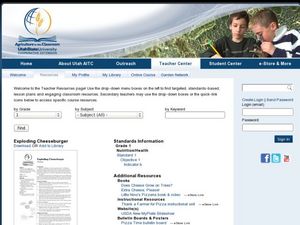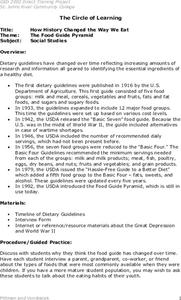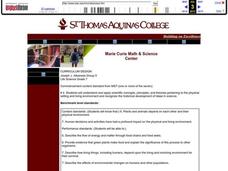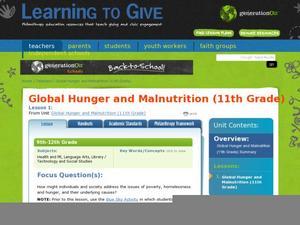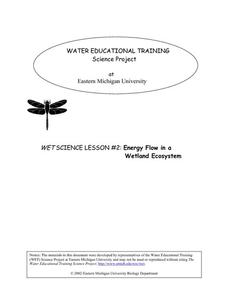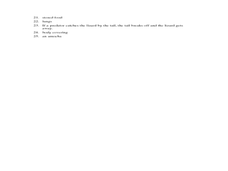Curated OER
Rosa Parks Community Garden
Students explore gardening and nutrition in the Rosa Parks Community Garden. They work in stations to discuss food choices, the life cycles of plants, and mini-composting. After starting in one station, they rotate to try each activity.
Curated OER
Exploding Cheeseburgers
Young scholars identify the components of a healthy diet. In this nutrition lesson, students discuss the parts of a cheeseburger and identify the food groups the cheeseburger is a part of. Young scholars discuss how carbohydrates and...
Curated OER
Sharing with Others (Private/Religious)
Students appreciate uniqueness and differences by comparing and contrasting fruit. In this differences lesson, students study fruits and analyze for similarities and differences. Students sort the fruit into five categories. Students...
Curated OER
idiom Quiz-Food
For this idiom worksheet, students choose an idiom that correctly replaces bracketed expressions in sentences. Students may click on an answer button for immediate feedback.
Curated OER
How History Changed the Way We Eat
Students participate in a lesson that is concerned with the history of the food pyramid and how it evolved and changed into its modern state. After being presented with the information they conduct classroom discussions about the research.
Curated OER
Eat Right!
Students discuss the food pyramid. They create healthy meals using the food pyramid.
Curated OER
Ecuadorian Rainforest
Have your class talk about the importance of the rainforest and the products that come from it. Learners watch a video showing the path of chocolate from the rainforest to the supermarket. They discuss how the rainforest and chocolate...
Curated OER
Adaptation Investigation - Extreme Beaks
Find photos of bird beaks or show a prepared four slide PowerPoint, "Extreme Beaks" to introduce your class to this special animal adaptation. Provide them with a data table and supplies to try gathering food with tools that each...
Curated OER
Plants and Animals
Seventh graders discover the interconnectedness of plants and animals in ecosystems. In groups, they create a food web and discuss the problems when one link of the chain is broken. To end the lesson, they set up a balanced environment...
Curated OER
Conventions: Adjectives
Investigate adjectives with writers. They define adjectives and create their own sentences describing objects found at home using adjectives correctly. Focus on the five senses and sensory details.
Outdoor Learning Center
Outdoor Survival
Which of the following can you survive without for the longest time: water, food, or a positive mental attitude? The answer may surprise you. Guide learners of all ages through games, activities, and discussions about surviving in the...
Curated OER
Global Hunger and Malnutrition
Is there a difference between hunger and malnutrtion? Is this a problem only in third world countries? How does hunger and malnutrition affect the community? Why do these problems exist when the world produces enough food to feed...
Global Change
Impact of a Changing Climate on the Pacific Walrus
How many of us can say they've seen a Pacific walrus? Not many and one of the reasons is the impact of climate change on their aquatic environment. Children get to think about the food web of the Bering Sea by creating an actual web with...
Purdue University
Healthy Body Image: Healthy Exercises for Every Body
From three-way neck rolls to a figure-5 hurdler's stretch, this is an ultimate guide to healthy exercises. It begins with a bulleted list of general guidelines on cardiorespiratory exercise, flexibility, resistance exercises, and range...
Eastern Michigan University
Energy Flow in a Wetland Ecosystem
How is energy transferred within an ecosystem? What would happen to a food web if one of the organisms was removed? Elementary or middle school ecologists examine these questions and more in a comprehensive 5E learning cycle lesson....
Curated OER
Happy Mealtimes
Young scholars read The Hungry Caterpillar to examine healthy eating habits. In this food and nutrition lesson, students role play the various responsibilities during family mealtime. They will discuss the struggles of healthy eating,...
Curated OER
Visual Vocabulary
Students interpret and name the vocabulary termed acted out by the mime. In this science/language arts/physical education lesson plan, students are given a set of vocabulary terms to discuss within their group. Next, students place all...
NOAA
Deep-Sea Ecosystems – Entering the Twilight Zone
Imagine an ecosystem without any light or oxygen, where living things convert carbon dioxide into food. This ecosystem is thriving and might just be the largest ecosystem on our planet, yet we know very little about it. The lesson...
Education World
Edible Resource Maps!
Young scholars discuss resource maps and examine examples from library resources. Working in groups, they create edible resource maps by drawing examples, such as popcorn on the border of Iowa and Nebraska. Then they use cookies in the...
Curated OER
Flutterings and Flowers
Fourth graders investigate the significance of natural resources and the habitats of butterflies. They create a list of their own favorite foods, then watch a video about habitats. Students identify things in the video that animals and...
Curated OER
A Visit from Spanish Speakers
Give your class this hypothetical letter telling them that some Spanish speakers from Mexico are coming to your school. These kids don't know English, so small groups will have to brainstorm ways to provide support. What kinds of...
Curated OER
Evidence of Photosynthesis
Hands on science is the way to go! Learners conduct a lab experiment to help them explain how plants make food through photosynthesis. They test for the presence of starch in leaves using iodine solution and identify the basic things...
Curated OER
Fifth Grade Science Assessment
In this science assessment worksheet, students complete a 25 question multiple choice quiz about biology. Plant and animal anatomy is included.
Chicago Botanic Garden
Leaf Litter Ecology Lab
Some organisms spend their entire lives in leaf litter. The third in a series of six is a great lesson exploring the community of leaf litter. Groups gather and then spread leaf litter over white paper and remove leaves/twigs while...



